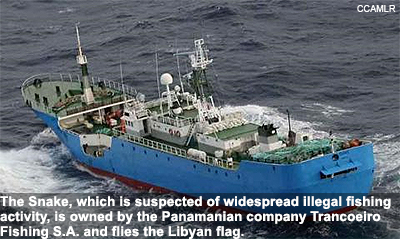New 'Most Wanted' List from INTERPOL Targets Illegal Fishing
Vessel suspected in extensive fisheries crime identified by Project SCALE
 The 70-meter (230-foot) fishing vessel Snake boasts a long history of illegal fishing: Its crew reportedly stole tons of fish from oceans around the world without regard to national or international fisheries laws. The Snake, which sported various names as it prowled the seas over the past decade, now is infamous for another reason—the dubious distinction of being the recipient of INTERPOL's first “Purple Notice” for illegal fishing vessels. This notice is a tactic that the international police organization uses to track down suspects in crimes as varied as child pornography and illegal logging.
The 70-meter (230-foot) fishing vessel Snake boasts a long history of illegal fishing: Its crew reportedly stole tons of fish from oceans around the world without regard to national or international fisheries laws. The Snake, which sported various names as it prowled the seas over the past decade, now is infamous for another reason—the dubious distinction of being the recipient of INTERPOL's first “Purple Notice” for illegal fishing vessels. This notice is a tactic that the international police organization uses to track down suspects in crimes as varied as child pornography and illegal logging.
INTERPOL took on the task of fighting illegal fishing around the world in February 2013 when it launched Project SCALE with support from Pew and the government of Norway. The Purple Notices, which target vessels suspected of engaging in illegal, unreported, and unregulated fishing, are the latest visible initiative under SCALE. They are intended to alert commercial fishing captains and fisheries enforcement personnel in INTERPOL-member countries to come forward if they have information about the wanted vessels. INTERPOL uses Purple Notices across its programs to find information about “method of operation, objects, devices, and concealment methods used by criminals.”
Tony Long, a former British Royal Navy officer who is director of the Pew Charitable Trusts' project to end illegal fishing, says the effort “requires a multipronged approach that includes utilizing real-time information and the keen eyes of people who are legally working the waters every day.” He adds that “INTERPOL's Purple Notices will help national authorities and maritime assets pinpoint suspected illegal vessels, bring their owners to justice, and significantly reduce criminal fishing.”
Each Purple Notice will include the vessel's most recent known names, aliases, call signs, alleged crimes, and other details. The alerts will also include, if available, photos, the vessel's last known location, and its International Maritime Organization number.
The IUU fishing problem
Illegal, unreported, and unregulated fishing, also known as IUU fishing, is a significant environmental, security, and economic threat to the world. IUU fishing vessels take up to 26 million metric tons of fish from the oceans each year and often engage in other illicit activities, including drug and arms smuggling, human trafficking, and forced labor.
Knowing the whereabouts and activities of any vessel on the ocean is a challenge, but fishing vessels are particularly tough to track because, unlike merchant ships, cars, and even cellphones, they are not required to have unique, permanent identifying numbers. Fishing vessel names, call signs, and flags of registration can be changed by the owner quickly and easily. The Snake, for example, has had 12 names, seven call signs, and eight flags since it was first suspected of IUU fishing over a decade ago.
Pew is pushing for mandatory International Maritime Organization, or IMO, numbers for all large fishing vessels. Such a policy would help authorities and fisheries managers monitor vessel activity at sea and in port, but it would not stop illegal fishing on its own. The Snake, in fact, has an IMO number and still has fished illegally for years, according to authorities. Pew is also urging widespread ratification of the Port State Measures Agreement, an international treaty designed to tighten controls at ports and keep illegally caught fish from entering the market.






